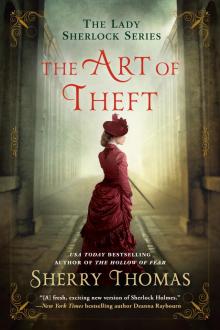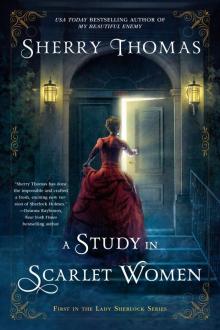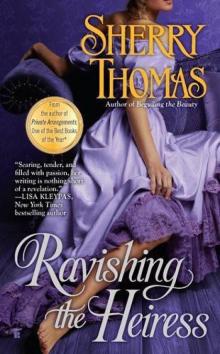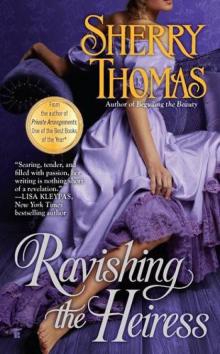- Home
- Sherry Thomas
The Art of Theft Page 12
The Art of Theft Read online
Page 12
She glanced at Lord Ingram.
“I can disrobe myself,” he said, when all he wanted was to drop to the floor in a heap and sleep until the end of the world.
Helpfully she provided a dressing robe. He groped his way to behind a screen and stripped. His wet clothes seemed glued to his body, and his hands were about as useful as those of an eighty-year-old arthritic. But he pulled and shoved every last thread of fabric from his body and put on the robe.
He had never been naked in a room with two women present, and certainly not two women whose sole focus was undressing a different man—he almost laughed as he came out from behind the screen.
Mrs. Watson and Miss Holmes already had Mr. Marbleton, also in a robe, in a chair near the potbellied stove. They’d put hot water bottles—pressing into service their canteens and even a few wine bottles wrapped in pillow cases—around him. Mrs. Watson set Miss Holmes to rubbing his feet. She herself pulled Lord Ingram into another chair, thrust a hot water bottle into his hands, and rubbed his feet.
“I would think myself in Heaven, Miss Olivia, if I could feel anything in my feet,” mumbled Mr. Marbleton.
Lord Ingram let out a breath he didn’t know he’d been holding. The young man was going to be all right.
They were both going to be all right.
* * *
In the morning, Charlotte and Lieutenant Atwood visited the offices of Le Temps, the Parisian newspaper of record, where Lieutenant Atwood had made an appointment for them to consult the archives. They worked quickly, checking indexes, pulling volumes, one person copying down relevant information while the other moved on to the next article.
After lunch, taken at a café, they went to their next appointment, a consultation with Monsieur Sauveterre, a mostly retired art dealer who remained highly respected for his encyclopedic knowledge. They hoped to find out what an expert thought of the art sales at Château Vaudrieu, though they planned to approach the subject obliquely.
They arrived in disguise, Lieutenant Atwood as Mr. Nariman, a scion of a prominent and wealthy Bombay Parsi family, and Charlotte as his rotund, bespectacled English friend Mr. Hurst.
Normally Monsieur Sauveterre might not be inclined to grant an audience to two strangers, but Lieutenant Atwood, along with his request, had sent along two bottles of vintage claret from Hôtel Papillon’s cellar. For that, they were received warmly.
After some pleasantries, Charlotte, as Mr. Hurst, got to the gist of the matter.
“You see, Monsieur, my friend here has put me in something of a dilemma. We have been traveling together, trying to see as much of the world as possible. I am not as well funded as he is and would have been obliged to stop soon, but for the fact that I recently inherited some paintings.
“I have no eye myself and little expertise in the arena. Those I’ve asked to appraise my new possessions have said anything from a thousand pounds for the lot—a dozen paintings in all—to four hundred pounds for this piece alone.”
She brought out a large envelope and extracted from it a watercolor measuring eighteen inches by twenty-four inches. Monsieur Sauveterre perched a pair of glasses on his nose and leaned in for a closer look.
“Ah, a work by Monsieur Turner. Very English.”
“My late aunt had very English tastes,” said Charlotte. “Mr. Nariman has grown impatient, waiting for me to affix a value to this Turner, and offered to buy it for sixteen hundred pounds.”
“Sixteen hundred pounds?” Monsieur Sauveterre’s brow raised. “That would be forty thousand francs.”
“Indeed, a small fortune—which is why I declined his offer.”
“And yet, from what I understand, a similar work exchanged hands for fifty thousand francs right here in Paris a few years ago,” pointed out Lieutenant Atwood, as Mr. Nariman.
This they did not glean from the archives of Le Temps, but from Lieutenant Atwood’s mother, who, according to him, had purchased two Turner pieces some time ago and was pleased to inform him, about a year ago, that she’d heard, via private channels, that a similar Turner watercolor in Paris had gone for twice what she had paid, no doubt presaging a rise in value for her own acquisitions.
“I have heard of that myself,” Monsieur Sauveterre admitted. “Although personally I would not take prices achieved at Château Vaudrieu as a benchmark.”
Aha, so that particular transaction had taken place at Château Vaudrieu.
“Château Vaudrieu?” repeated Charlotte. “Is that the name of a Parisian gallery?”
“No, it is an actual château not far outside the city. In recent years, it’s become well-known for an annual December ball. But the ball is also the occasion of an art sale—and at times the prices fetched there have been spectacular.”
“Hmm,” said Charlotte. “Is everything there sold at prices you would consider inflated, Monsieur?”
“No indeed!” cried Mr. Sauveterre. “Sometimes pieces go for reasonable prices. Sometimes there are excellent bargains to be had—or so I’ve heard.”
He rather hastened to give the appearance of even-handedness, to make sure that on the whole, he could not be accused of having pronounced Château Vaudrieu’s prices too high.
“In other words, exactly as it would be at any other marketplace for art.” Lieutenant Atwood turned to Charlotte. “Art isn’t corn, my friend. There is no fixed price. For me to pay you anything less than the highest price your Turner could fetch would be highway robbery.”
“Ah, but Monsieur,” said Monsieur Sauveterre, now more unhurried in his speech, “you did come seeking my opinion. Château Vaudrieu notwithstanding, my professional honor would not allow me to let anyone pay forty thousand francs for a forty-five-centimeter-by-sixty-centimeter watercolor.
“On the other hand, the trend in favor of Mr. Turner’s work has been clear. In the thirty-odd years since his passing, his reputation has grown and the value placed on his oeuvre has appreciated considerably. I see no reason why that should come to an abrupt halt: England is wealthy, and there remains a large supply of men and women willing to pay premium prices for one of the country’s foremost artists.
“Everything considered, I would decree twenty-one thousand five hundred francs as a fair price for this transaction between friends.”
“So . . . eight hundred and sixty pounds? Done,” said Charlotte. “I will not take one penny more than what Monsieur has declared fair.”
Lieutenant Atwood scoffed. “I still think it’s highway robbery, but it was my idea to let the matter be settled by a professional, so I must abide by Monsieur’s price.”
“Deal!” said Charlotte.
“Deal,” said Lieutenant Atwood
They shook hands and thanked Monsieur Sauveterre for his help. The art dealer, in return, thanked them again for their earlier gift of wine. “My supplier ran out of his last bottle of this particular vintage five years ago. I shall lord it over him next time we meet.”
As they rose to take their leave, Charlotte asked, as if it were an afterthought, “Monsieur, although our little problem is solved, I can’t help but be curious about the prices at Château Vaudrieu. In general, do they skew high or low?”
“That is hard to say,” answered Monsieur Sauveterre, sounding cautious. “I have never been to Château Vaudrieu myself, and everything I hear is second-, sometimes thirdhand. I do not have the complete picture.”
“Nobody has the complete picture on anything,” Charlotte persisted. “We glean what information we can, and we make our judgment based on that. Given what you know, which is probably more than most, what do you think?”
Monsieur Sauveterre laughed dryly. “I think that the presence of unlimited champagne and beautiful women can muddle the thinking of otherwise clearheaded men. And that’s all I can say on the matter.”
So he did believe that prices there were inflated, but would not state so ou
tright.
Charlotte turned to Lieutenant Atwood. “I say, old chap, we should get ourselves invited to the ball and see with our own eyes what kind of champagne and women make otherwise clearheaded fellows pay double for art.”
“Well, why not?” said Lieutenant Atwood. “We’ll be in town until after Christmas. When is the ball?”
They looked toward Monsieur Sauveterre, who said, with almost visible reluctance, “Oh, ten or twelve days from now, I believe.”
“I can find out the exact date,” said Charlotte. She patted Lieutenant Atwood on the back. “And you, Nariman, can get us into any gathering.”
Mr. Nariman inclined his head. “But of course, my friend.”
Monsieur Sauveterre saw them out, smiling. But it was the kind of smile that would turn into a frown as soon as the door closed behind them.
* * *
Mrs. Watson, whose warmth belied her ferocity, did not let either Lord Ingram or Mr. Marbleton close their eyes until they’d reached Hôtel Papillon in Paris.
Lord Ingram was installed in an opulently appointed bedroom. Mrs. Watson repeatedly questioned him to make sure that he was lucid. After checking his hands and feet one last time, she gave him a cup of hot chocolate that was at least half whisky, packed him with three hot water bottles—proper vulcanized rubber ones—and at last allowed him to sleep.
He woke up to the sight of Holmes sitting in a chair, her head bent. He didn’t get too many opportunities to study her closely. Even when they found themselves in physical proximity, there was still the matter of her unnerving, sometimes all-seeing gaze.
With something of a shock he realized that after the near misadventure the night before, what he wanted was for her to raise her face and settle that exact unnerving, sometimes all-seeing gaze upon him.
He opened his mouth to speak and closed it again. He’d almost asked her what she was reading, but she wasn’t reading. She was knitting. He sat up to make sure he wasn’t dreaming.
“What are you knitting?”
The question he really wanted to ask was You knit? But that would probably net him only a blank stare, the thought of which made him smile on the inside.
She looked up, wearing her usual expression of utter serenity. “A cozy for a hot water bottle.”
A what?
He laughed. All at once he could see her as a plump, white-haired old woman with a half-finished muffler on her lap, her grandmotherly demeanor fooling all those who didn’t know her. Maybe he’d suffered too much last night and gone a little cracked, but he felt an extraordinary glee at the image in his head.
“I see you are well,” she said. “No lingering ill effects from your prolonged soaking at Château Vaudrieu.”
“I’m a little groggy but otherwise fine.”
She nodded, seeming not at all worried. But that she was here, waiting for him to wake up, was evidence enough of her concern. “Mrs. Watson has instructed me to be highly solicitous. Are you hungry?”
He was and said so. She left and returned with a large footed tray and set it down over his lap. Leaning her hip against the side of the bed, she poured him a cup of coffee.
“Mrs. Watson has decided that plain toast and French baked eggs make for acceptable convalescent fare,” she said. “You take your coffee black, as I recall.”
They’d never had coffee together. And he was sure he’d mentioned coffee only once in their entire acquaintance, many years ago, when she was lamenting the fact that he’d visited France without bothering to set foot inside a patisserie. In that same conversation she’d wanted to know what he’d had for breakfast during his French holiday and had been scandalized when he’d said black coffee and maybe, when he was in the mood, a slice of toast—but only when he was in the mood.
Come to think of it, he’d been pleased to find out that Lady Ingram had as little interest in breakfast as he did. Had thought it a further sign that they were true soul mates. Which only went to show that the choice of soul mates should not be left to barely post-adolescent young men.
Holmes, of course, would dispute the validity of the concept of soul mates in the first place.
“Yes, black coffee,” he said.
She left the bed, pulled up a chair nearby, and resumed her knitting. He grinned with that same glee and put on a grown-up expression only when she looked up. But she’d seen his delight, and for a moment, he thought he again saw that smile in her eyes.
His heart floated.
“What happened at the château?” she asked. “Mrs. Watson said all she could get out of you was ‘dogs’ and ‘lake.’”
He cleared his throat and turned his focus back to their task.
“‘Dogs’ and ‘lake’ comprise, more or less, the sum total of what happened.” When Mrs. Watson had asked her question, he’d been so sleepy, his mind so dull, that even those two words had taken superhuman effort. “Is Mr. Marbleton all right?”
“He is still sleeping. But he was briefly awake two hours ago and he was fine then.”
“The ladies?”
“Mrs. Watson has retired for the night. Livia is still with Mr. Marbleton.”
“She should rest, too.”
“I have told her that, but I don’t believe she will until she is convinced he is out of danger,” said Holmes. “Now let me hear some details about dogs and lake.”
He gave her an account of the night. She listened attentively, though her knitting needles never stopped clicking.
He loved that gentle, rhythmic sound.
Although . . . perhaps that was simply because it was easier to admit that he loved the sound rather than that he loved the woman.
“So they were all headed to a particular section of the fence, not far from the chapel. And then they all disappeared in the space of a minute or so.”
“That’s correct.”
“I see.”
“You mean that you heard me—or that you know what happened?” With Holmes, he wouldn’t be surprised if it was the latter.
She didn’t answer but took photographs out of an envelope. “Have you seen the château by day?”
He shook his head.
“These are pictures Mr. Marbleton took with his detective camera—I brought the exposed roll of photographic paper back to Paris and Lieutenant Atwood developed them.” She handed him one of the images. “This is the chapel. From outside the fence, I couldn’t see the bridge for the chapel. I assume then you couldn’t see the other side of the chapel either, from under the bridge?”
“No, we couldn’t.”
“Could you see the door of the chapel?”
“I think not. We could see the back and the southern side of the chapel. It faced away from us.”
She nodded.
“You think dogs and men all disappeared inside the chapel and later reemerged?”
“Or that they were on the far side of the chapel from you.”
“They were chasing something. Neither dogs nor people run like that unless they have a goal in mind. But I never saw what they were chasing.”
“How can you be sure they weren’t being chased?”
He stumbled over the question, the toast halfway to his mouth forgotten. Only after a few seconds was he able to say, with some certainty, “They weren’t being chased—they never looked back.”
“Speaking from experience?”
“You can deduce that even with logic,” he said. “The pursuers can see the quarry. The quarry must look back to gauge whether his pursuers are gaining on him, whether more are joining from different directions, whether they have firearms and are willing to use them. The men and the dogs I saw were pursuers.”
She nodded. “I trust you to know the difference.”
He exhaled and finished his toast. She came out of her seat and leaned over the bed. He again forgot about his food, but
she only pilfered a slice of bread, spread it with a bit of butter, and took a bite.
At least once in his life, he would like for her to look at him as she would a morsel of fine French pastry. Or a slice of Victoria sandwich. Or even a humble piece of buttered bread.
Something came over her when she relished her food. At afternoon tea parties, when she was still an eligible young lady, she frequently ignored the gentlemen in favor of a plate of miniature iced cakes. And the gentlemen, subtly or unsubtly, from every corner of the room, would peer at her, sometimes over the shoulders of young ladies they were ostensibly talking to, because of the unabashed desire on her face—and the potent pleasure she emanated in consuming those objects of desire.
“I’ve never seen you take so little butter,” he said.
“I shouldn’t have any butter at all. But it is high misery indeed, to be battling Maximum Tolerable Chins in France, of all places. A little butter eases the suffering.”
“You look fine to me.”
Everything about her was slightly fuller—her bodice, most notably. It was a test of his own self-control not to let his eyes stray to her bosom, to those few buttons that seemed to be in imminent danger of popping open.
“Alas,” she said lightly but firmly, “in this case, I am the only one who can judge whether and how the battle should be fought. But by all means rain down further compliments, while I order my troops and weigh my strategies.”
She was only a fraction as vain as she was perceptive. But given her tremendous perspicacity, her concern for her appearance was no insignificant matter. He sighed in resignation. “Oui, mon général.”
She glanced at him. Her eyes were her best features, wide set, thickly lashed, and deceptively transparent, hinting at a guileless sweetness antithetical to her true nature.
Silence. Only the barely audible flickers of the gas lamps reached his ears—and the sounds of her soft breaths.
He found himself staring at her lips. Her lips were decadent. All of her was decadent. She leaned closer, her pupils turning dark. And he was only hunger, only need.

_preview.jpg) Claiming the Duchess (Fitzhugh Trilogy Book 0.5)
Claiming the Duchess (Fitzhugh Trilogy Book 0.5) The Art of Theft
The Art of Theft The Magnolia Sword: A Ballad of Mulan
The Magnolia Sword: A Ballad of Mulan A Study In Scarlet Women
A Study In Scarlet Women The Hollow of Fear
The Hollow of Fear The Magnolia Sword
The Magnolia Sword Beguiling the Beauty ft-1
Beguiling the Beauty ft-1 The Heart is a Universe
The Heart is a Universe The Hidden Blade: A Prequel to My Beautiful Enemy (Heart of Blade)
The Hidden Blade: A Prequel to My Beautiful Enemy (Heart of Blade) Ravishing the Heiress ft-2
Ravishing the Heiress ft-2 The Immortal Heights
The Immortal Heights The Hidden Blade
The Hidden Blade Ravishing the Heiress
Ravishing the Heiress Tempting the Bride
Tempting the Bride The Luckiest Lady in London
The Luckiest Lady in London The Bride of Larkspear: A Fitzhugh Trilogy Erotic Novella
The Bride of Larkspear: A Fitzhugh Trilogy Erotic Novella Claiming the Duchess
Claiming the Duchess The One in My Heart
The One in My Heart His At Night
His At Night A Dance in Moonlight
A Dance in Moonlight A Conspiracy in Belgravia
A Conspiracy in Belgravia Not Quite a Husband
Not Quite a Husband